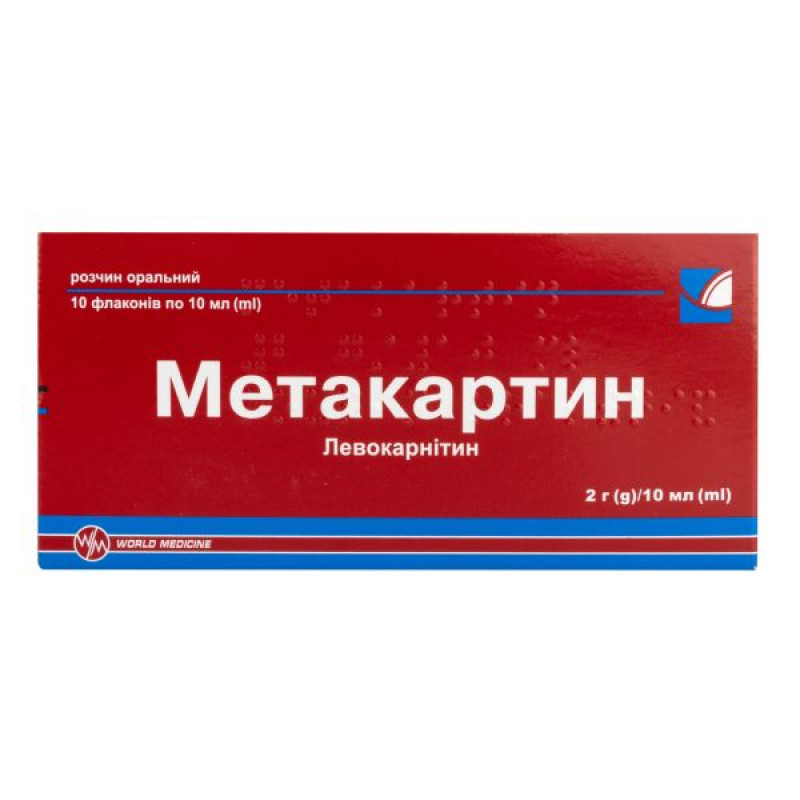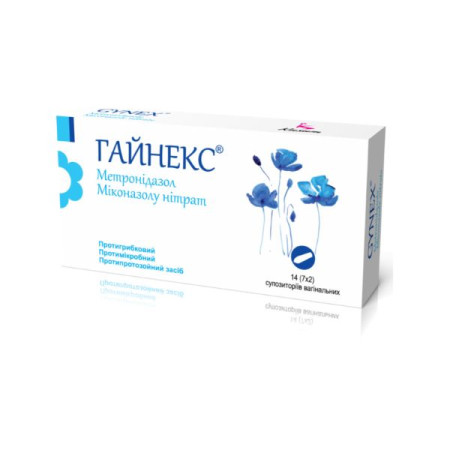Metakartin oral solution 2 g / 10 ml 10ml No. 10

Instructions for use Metakartin oral solution 2 g / 10 ml 10 ml No. 10
Composition
active ingredient: levocarnitine;
1 bottle (10 ml) of the drug contains 2 g of levocarnitine;
excipients: malic acid, sodium benzoate (E 211), sodium saccharin, orange flavoring, purified water.
Dosage form
Oral solution.
Main physicochemical properties: transparent colorless or light yellow solution.
Pharmacotherapeutic group
Amino acids and their derivatives. Levocarnitine. ATC code A16A A01.
Pharmacological properties
Pharmacodynamics
Carnitine is a natural component of cells, in which it plays a fundamental role in the processes of energy synthesis and transport. It is practically the only indispensable factor for the process of penetration of long-chain fatty acids into mitochondria and their participation in β-oxidation. In addition, carnitine controls the transport of energy produced by mitochondria into the cytoplasm by modulating the enzyme adenine nucleotide translocase.
The highest concentrations of carnitine are observed in skeletal muscles and myocardium. The myocardium, despite its ability to use various substrates for energy, usually uses fatty acids. Therefore, carnitine plays an important role in cardiac metabolism, since the oxidation of fatty acids strictly depends on the presence of a sufficient amount of the substance. Experimental studies have shown that in various states of stress, acute ischemia, diphtheria myocarditis, a decrease in the level of carnitine in myocardial tissues can be observed. Studies using various animal models have confirmed the beneficial effect of carnitine in various changes in heart function caused artificially: acute and chronic ischemia, heart failure, heart failure on the background of diphtheria myocarditis, drug cardiotoxicity (propranolol, adriamycin).
Levocarnitine has demonstrated therapeutic efficacy in the following pathologies:
primary carnitine deficiency characterized by phenotypes such as lipid-storing myopathy, Reye's syndrome-like hepatic encephalopathy, and/or progressive dilated cardiomyopathy;
secondary carnitine deficiency in patients with organic aciduria of genetic origin (propionic acidemia, methylmalonic aciduria, isovaleric acidemia) and in patients with genetic defects of β-oxidation. In such situations, the secondary deficiency manifests itself in the accumulation of fatty acid esters. In fact, endogenous levocarnitine acts as a buffer against various fatty acids that cannot be metabolized;
Secondary carnitine deficiency in patients on intermittent hemodialysis. Decreased muscle levocarnitine levels are positively correlated with its loss with the dialysis fluid.
Muscle symptoms, which are usually observed in such patients after a hemodialysis session, improve with levocarnitine therapy.
Pharmacokinetics
After oral administration, levocarnitine is degraded by intestinal bacteria to form trimethylamine (TMA) and γ-butyrobetaine. Since the amount of levocarnitine that reaches the systemic circulation unchanged is about 10–20%, intestinal metabolism is thought to be responsible for the elimination of approximately 80–90% of the oral dose.
After absorption, γ-butyrobetaine is excreted unchanged in the urine, while TMA is metabolized to trimethylamine-M-oxide (TMAO), which is found in the urine along with a small amount of unchanged TMA.
Long-term oral administration of levocarnitine to patients with severe renal failure or patients on hemodialysis may lead to the accumulation of TMA and TMAO in the blood plasma and, as a result, cause trimethylaminuria - a pathological condition characterized by the presence of a strong fishy odor in urine, exhaled air, and sweat secretions in patients.
Indication
Primary and secondary carnitine deficiency.
Contraindication
Hypersensitivity to the active substance or to the excipients of the medicinal product.
Interaction with other medicinal products and other types of interactions
Interactions between levocarnitine and coumarin derivatives cannot be excluded. In very rare cases, increases in the international normalized ratio (INR) have been reported when levocarnitine was administered concomitantly with coumarin derivatives (see sections 4.4 and 4.8). In the event of concomitant use, INR monitoring or other coagulation tests should be performed weekly until stabilization and monthly thereafter (see section 4.4).
Concomitant use of levocarnitine with agents that induce hypocarnitineemia by increasing renal excretion of carnitine (e.g. valproic acid, prodrugs containing pivalonic acid, cephalosporins, cisplatin, carboplatin, ifosfamide) may reduce its levels.
Application features
The use of levocarnitine in patients with diabetes mellitus who are taking insulin or oral hypoglycemic agents that improve glucose utilization may cause hypoglycemia. In such patients, it is necessary to constantly monitor the level of glucose in the blood plasma for timely correction of the hypoglycemic treatment regimen.
The use of levocarnitine in patients with a history of seizure activity may increase the frequency and/or severity of seizures. In patients with predisposing factors, the use of levocarnitine may also cause seizures.
The safety and efficacy of oral levocarnitine in patients with renal insufficiency have not been studied. Prolonged oral administration of high doses of levocarnitine to patients with severe renal insufficiency or end-stage renal disease undergoing hemodialysis may result in accumulation in the blood of the potentially toxic metabolites trimethylamine (TMA) and trimethylamine-M-oxide (TMAO), since these metabolites are normally excreted by the kidneys. This situation is not observed after intravenous administration of levocarnitine.
Levocarnitine is a physiological product, so there is no risk of addiction or dependence.
Very rarely, an increase in INR has been reported with the concomitant use of levocarnitine with coumarin preparations (see sections "Interaction with other medicinal products and other forms of interaction", "Adverse reactions"). In case of concomitant use of these agents, INR monitoring or other coagulation tests should be performed weekly until stabilization and monthly thereafter.
Use during pregnancy or breastfeeding
Pregnancy
No teratogenic effects were observed in preclinical studies of levocarnitine. At the highest dose tested, 600 mg/kg body weight, a statistically insignificant increase in the incidence of post-implantation fetal death in early pregnancy was observed in animals. The relevance of these results to humans is unknown.
Adequate clinical studies have not been conducted in pregnant women. During pregnancy, the drug should be used if the benefit to the woman outweighs the potential risk to the fetus.
Breastfeeding period
Levocarnitine is a normal component of human milk. The use of levocarnitine in nursing mothers has not been studied. During breastfeeding, the drug should be used if the benefit to the woman outweighs the potential risk to the child from excessive exposure to carnitine.
Fertility
No negative effects on fertility were found in clinical studies.
Ability to influence reaction speed when driving vehicles or other mechanisms
Levocarnitine does not affect the ability to drive or use other mechanisms.
Method of administration and doses
Method of application
The medicine is intended for oral use. Before use, the solution should be diluted in a glass of water and taken 30 minutes before meals. For dosing, use a dosing syringe or measuring cup.
During the use of the drug, it is advisable to monitor the levels of free carnitine and acyl-carnitine in both blood plasma and urine.
Dosage
The dose and duration of treatment with levocarnitine is determined by the doctor individually depending on the age, body weight, and nosological form of the patient's disease.
Adults
Primary and secondary carnitine deficiency
Dosage depends on the specific inborn error of metabolism and the severity of the patient's condition during treatment.
The generally recommended oral dose is 100 to 200 mg/kg per day in 2–4 divided doses; in less serious conditions, the dose may be lower (50–100 mg/kg per day).
If clinical and biochemical signs do not improve, the dose may be increased for a short period.
In acute metabolic disorders, higher doses (up to 400 mg/kg/day) or intravenous administration of levocarnitine at a daily dose of 100 mg/kg may be necessary.
Secondary carnitine deficiency in patients undergoing hemodialysis.
If significant clinical results have been achieved after the first course of intravenous administration, maintenance therapy at a dose of 1 g per day by oral administration can be used. On the day of dialysis, oral administration of the drug should be carried out after the procedure.
The maximum daily dose for adults is 6 g (30 ml).
The average course of treatment for adults and children is 1–3 months. If necessary, the course of treatment can be repeated. In case of primary and secondary carnitine deficiency, the drug should be used continuously or until the cause of the latter is eliminated.
Children
The drug should be used in children from the first day of life, including premature babies. The solution should be taken starting at a dose of 50 mg/kg per day. The usual dose for children is 50–100 mg/kg per day (see table).
| Age | Single dose | Number of receptions per day |
| Newborns | 100 mg (0.5 ml) | 2–3 |
| Children under 1 year of age | 100–200 mg (0.5–1 ml) | 2–3 |
| Children aged 1–3 years | 200–400 mg (1–2 ml) | 3 |
| Children aged 4–6 years | 400–600 mg (2–3 ml) | 3 |
| Children aged 7–11 | 500–800 mg (2.5–4 ml) | 3 | Children aged 12 and over | 800–1000 mg (4–5 ml) | 3 |
The maximum daily dose for children is 3 g (15 ml).
Special categories of patients
Patients with renal insufficiency
The drug should not be used for a long time in high doses in patients with severe renal impairment due to the accumulation of potentially toxic metabolites TMA and TMAO (see section "Special warnings and precautions for use").
Elderly patients
No dosage adjustment or other precautions are necessary for these patients. In clinical studies, the safety profile in young and elderly patients was similar.
Patients with diabetes
The use of levocarnitine in patients with diabetes mellitus who are taking insulin or oral hypoglycemic agents that improve glucose utilization may cause hypoglycemia. In such patients, it is necessary to constantly monitor the level of glucose in the blood plasma for timely correction of the hypoglycemic treatment regimen (see section "Special instructions").
Children
The medicine can be used in children from the first day of life.
Overdose
Overdose or prolonged use of levocarnitine may cause diarrhea. Levocarnitine is easily removed from blood plasma by dialysis.
Side effects
Adverse reactions (based on clinical studies, literature and post-marketing experience) are listed by system organ class according to the MedDRA medical dictionary of regulatory activities and are classified according to the following frequency: very common (≥1/10), common (≥1/100, <10), uncommon (≥1/1000, <100), rare (≥1/10000, <1000), very rare (<1/10000), frequency unknown (frequency cannot be estimated from the available data). Within each frequency grouping, adverse reactions are presented in order of decreasing seriousness.
From the nervous system:
uncommon – headache; frequency unknown – convulsions1, dizziness.
From the heart:
frequency unknown – feeling of palpitations.
From the vascular side:
uncommon – arterial hypotension, arterial hypertension.
From the respiratory system, chest organs and mediastinum:
frequency unknown – shortness of breath.
From the digestive tract:
often - nausea, vomiting, diarrhea, abdominal pain; infrequently - dysgeusia, dyspepsia, dry mouth.
Skin and subcutaneous tissue disorders:
uncommon – abnormal body odor2; frequency unknown – itching, rash.
Musculoskeletal and connective tissue disorders:
uncommon – muscle spasms; frequency unknown – myasthenia gravis, muscle tension.
General disorders and administration site conditions:
uncommon – chest pain, feeling abnormal, pyrexia.
Research:
infrequently - increased blood pressure; very rarely - increased INR4.
1 Cases of seizures have been reported in patients with or without seizure activity who have received oral or intravenous levocarnitine. Levocarnitine may increase the frequency and/or severity of seizures. Levocarnitine may also cause seizures in patients with predisposing factors.
2 Long-term oral administration of levocarnitine to patients with severe renal insufficiency or patients undergoing hemodialysis may lead to the accumulation of TMA and TMAO in the blood plasma and, as a result, cause trimethylaminuria - a pathological condition characterized by the presence of a strong fishy odor in urine, exhaled air, and sweat secretions in patients (see section "Pharmacological properties. Pharmacodynamics").
3 Mild symptoms of myasthenia gravis have been reported in patients with uremia.
4 Very rare cases of increased INR have been reported in patients receiving concomitant therapy with coumarin-containing drugs (see sections 4.5 and 4.4).
Reporting of suspected adverse reactions.
Reporting adverse reactions after the registration of a medicinal product is important. This allows monitoring of the benefit/risk ratio when using this medicinal product. Medical and pharmaceutical professionals, as well as patients or their legal representatives, should report all cases of suspected adverse reactions and lack of efficacy of the medicinal product via the Automated Information System for Pharmacovigilance at the link: https://aisf.dec.gov.ua.
Expiration date
4 years.
Storage conditions
Store at a temperature not exceeding 25 ºС in a place inaccessible to children.
Packaging
10 ml in vials; 10 vials in a cardboard box.
Vacation category
Without a prescription.
Producer
WORLD MEDICINE ILACH SAN. VE TIJ. A. Sh. / WORLD MEDICINE ILAC SAN. VE TIC. AS
Location of the manufacturer and address of its place of business
15 Temmuz Mahallesi Cami Yolu Caddesi No:50 Gunesli Bagcilar / Istanbul, Turkey / 15 Temmuz Mahallesi Cami Yolu Caddesi No:50 Gunesli Bagcilar / Istanbul, Turkey.
Applicant
WORLD MEDICINE, LLC, Ukraine.
There are no reviews for this product.
There are no reviews for this product, be the first to leave your review.
No questions about this product, be the first and ask your question.


















